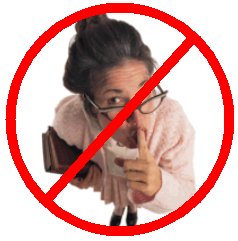
 |
You Don't Look Like a Librarian!Librarians' views of public perception in the Internet ageRuth A. Kneale, Special Library Association, June 2002 |
"You don't look like a librarian!" I heard that so often while I was in library school in 1997-99 that I set my email signature file to be that quote, and vowed that I wouldn't change it until I went two months without hearing it. Well, I finally changed my signature file in the spring of 2002! Do you look like a librarian?
Isn't that an interesting question? What are we supposed to look like? Ask any person in the street what image comes to mind when they think of a librarian, and inevitably they'll say an older woman, with her hair in a tight bun, wearing glasses, a cardigan, and sensible (meaning ugly) shoes. (And she usually says "Shh" a lot.) For those of us who don't match this stereotypical image, the usual response is something along the lines of "But you don't look like one!"
The perception of librarians in the world today doesn't seem to have changed much since the days of Marian the Librarian. Why is that? With the advent of the Internet and the explosion of personal computers, professions that were formerly considered "geeky", "nerdy" and unfashionable - like computer programmers, database administrators, etc., - are now hip, cool, and definitely groovy. And we won't even talk about webmasters! But what happened to the librarians? We deal with computers every day, we administer databases, and quite often we're also the webmasters of an organization. Why do people think that we not only still look like the mid-century's stereotype, but that we're not the folks to ask about computers, Internet searches, or the World Wide Web?
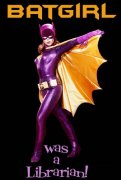 I
decided to do a bit of investigating and find out. In late 2000 I
started talking with the Physics-Astronomy-Math (PAM) division's
chair-elect, Kris Fowler, about the possibility of presenting a talk
at the Special Library Association (SLA). She told me that SLA 2001
already had a talk on the topic - a hot one in librarianship today! -
but perhaps we could work something out. I attended Alison Hall's
excellent presentation titled "Batgirl was a Librarian, and so was
Casanova", on the image of librarians until the mid-80's, and was
quite pleased. Since I wanted to focus on the Internet age, Kris was
kind enough to pitch my talk as a follow-on to Alison's, and thus I
obtained a slot at SLA 2002, titled "You don't look like a
librarian!"
I
decided to do a bit of investigating and find out. In late 2000 I
started talking with the Physics-Astronomy-Math (PAM) division's
chair-elect, Kris Fowler, about the possibility of presenting a talk
at the Special Library Association (SLA). She told me that SLA 2001
already had a talk on the topic - a hot one in librarianship today! -
but perhaps we could work something out. I attended Alison Hall's
excellent presentation titled "Batgirl was a Librarian, and so was
Casanova", on the image of librarians until the mid-80's, and was
quite pleased. Since I wanted to focus on the Internet age, Kris was
kind enough to pitch my talk as a follow-on to Alison's, and thus I
obtained a slot at SLA 2002, titled "You don't look like a
librarian!"
In preparation for this talk, I sent a survey to a total of 2377 librarians via several email discussion lists in mid-December, 2001, and began collecting articles, quotes, images and input. I wanted to find out what librarians felt their patrons thought of them, and see how the media presented images of librarians nowadays. From the 337 responses (a 14% response rate, which is not bad at all!), these are my results, along with the rest of the information I presented at SLA 2002. (Additional information and conference results are included in italicized parenthetical comments.)
|
"In the public psyche, a librarian is a woman of indeterminate
age, who wears spectacles; a person with either a timorous disposition
or an austere disposition, wearing a long sleeved blouse buttoned to
the neck; someone who loves silence, likes books, and suffers
people. Librarians don't laugh. They are covered with a thin film of
dust. They have pale skins, which, when touched (as if one ever could)
might flake and prove to be reptilian scales."
From "Between the Stacks", by Barry Bowes |
This quote seems to embody the image of librarians. But here's another one that's a bit more to my liking:
|
"Fortunately, a small segment of our population, librarians, has
been dealing with the problem of information organization since 2000
B.C. Who better to turn to in our time of need than people with
thousands of years of accumulated expertise and experience?"
From "Bookmarks", by Eugene Eric Kim |
Which one, though, more accurately reflects how we're viewed today? I hoped to at least get a sliver of an answer from my survey results. The email discussion lists they were originally sent to were very specific to my own leanings (the PAM-net list and the Solo-Lib list), and the survey ended up being forwarded to some law lists as well (Law-Lib and SCALL), giving me quite an interesting blend of responses! Here they are:
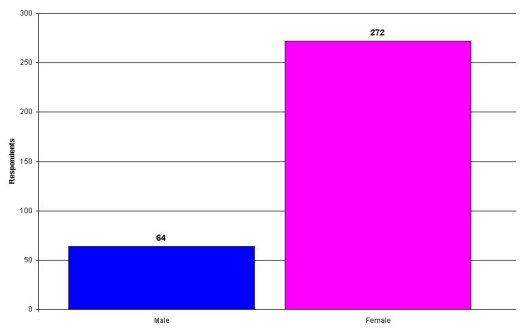
Unsurprisingly, most of my survey respondents were women. However, almost every single man who responded mentioned something about the existing, and very strong, gender stereotype of librarians. They all said that they were met with surprise when they stated their profession, along with comments like "How can you be a librarian? You're a man!" and "I thought being a librarian was a woman's job." (Most of the men in the audience at the talk had similar responses.)
The ages of the respondents varied across the spectrum:
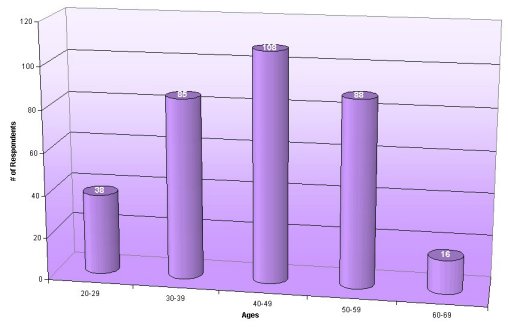
Many articles nowadays lament the graying of the profession. However, from my data, it looks like we have a healthy-enough inflow of new librarians to offset the retiring ones when they go forth to their much-deserved retirement. That is, if the incoming librarians stay in the field! But...there are concerns about the loss of traditional skills in the face of the influx of technical skills brought to the party by the "new breed" of librarians. That will affect the profession, for sure...but then again, it seems that the profession itself is moving in the same technical direction. (I guess we'll find out what's true in another few years!!)
I was happy to get responses from around the world:
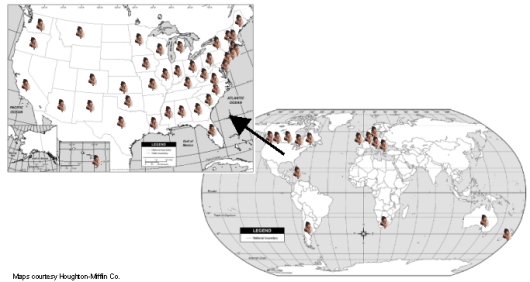
In addition to many responses from the USA and Canada, I also received replies from Argentina, Croatia, the Netherlands, New Zealand, South Africa, Sweden, and Switzerland. It was interesting to discover that our European and Antipodean counterparts have the same image problems as we do!
Over the course of this talk, I'll be sharing several print ads with you that are currently appearing in various magazines. We're going to start off with the mildest of them, or at least the one that generated the least amount of fervent discussions on the various e-mail lists:
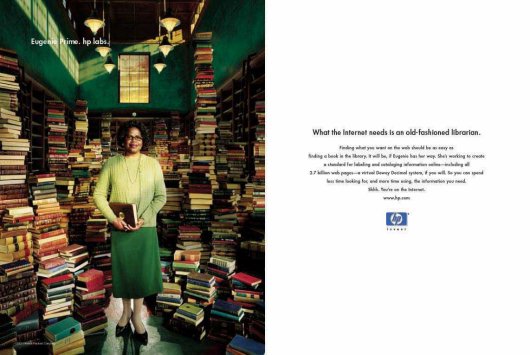
The text reads: "What the Internet needs is an old-fashioned librarian. Finding what you want on the web should be as easy as finding a book in a library. It will be, if Eugenie has her way. She's working to create a standard for labeling and cataloging information online - including all 2.7 billion web pages - a virtual Dewey Decimal system, if you will. So you can spend less time looking for, and more time using, the information you need. Shh. You're on the internet."
I think we can generally say that this is a positive image of a modern librarian... BUT: look at the stereotypical way she is presented! "Old-fashioned librarian." "Shh." And she's wearing the infamous "twin set and pearls". It would seem that, since everyone is familiar and comfortable with the stereotype's portrayal, using that as a bridge to a new technological kind of librarian was inevitable - but still! I wish they'd portrayed Eugenie a bit differently. (I was told by an audience member at the conference that they'd heard Ms. Prime speak several times, and she was anything but the quiet, retiring librarian the stereotype expects. Yeah!)
Now, let's talk about degrees. One respondent said, "A librarian has both a college degree and a graduate degree in librarianship. Otherwise that person is not a librarian, no matter what title a misinformed employer may give that person." She then declined to complete the survey, apparently because I'd asked this question. But... the fact is, not everyone who works as a librarian has an MLS (or MLIS, or other equivalent). And, many respondents had worked in a paraprofessional situation before going on to their professional degree (I'm one of them, and more than half of the conference attendees also went this route).
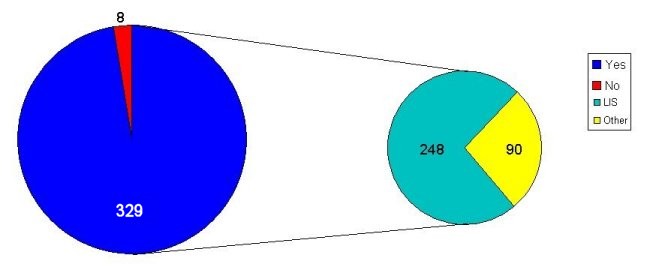
While most of the respondents had an advanced college degree, they weren't all in librarianship. A quarter of them had advanced degrees in other fields: Anthropology; Art; Asian Studies; Biochemistry; Bioethics; Biology; Business Administration; Chemistry; Creative Writing; Economics; Education; Finance; Fine Arts; French Literature; Geology; German; History; International Management; International Relations; Journalism; Law; Legal Studies; Marketing; Nursing; Organizational Behavior; Paleontology; Philosophy; Psychology; Rhetoric; Sociology; Statistics; and Theater.
A common perception of the public's is that "anyone who works in a library is a librarian", and often people don't think (or are surprised to find) that we need advanced degrees to do what we do. How can we change this?
The U.S. Bureau of Labor Statistics has predicted a net increase of more than 10,000 information professionals in the US labor force by the year 2010 (I wonder how many of them will have degrees in librarianship?) (However, I've just discovered that they also project that jobs in librarianship will grow more slowly than average in the same time frame. Hmmm.)
The length of time respondents have been working in libraries was an interesting result. There's a spike at 4 years, and another at 21; the 4-year spike seems to back up the earlier age-based conclusion about the possibly unnecessary concerns over the looming retirement numbers. But that assumes they all stay in librarianship, and that's a difficult assumption nowadays!
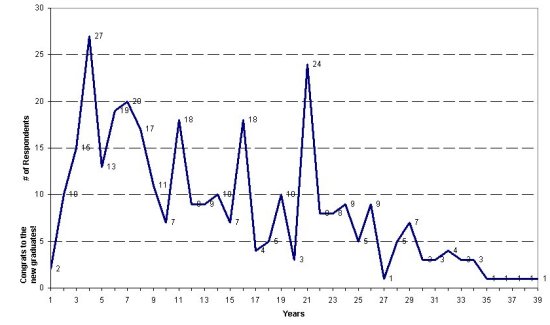
And what kinds of library are all these librarians from?
Now, let's talk labels... what we're called.
One respondent told me, "I've discovered that our company's clients accept the value of work done by an Information Specialist, but balk at paying for a Librarian's time, even if it's for the same work." It's all about the labels - how we're perceived based on what we're called. Knowledge Management is the same thing - for a long time we've known that "Information Resources Management" is basically librarianship, and "Knowledge Management" is basically "Information Resources Management". Well, the April 2002 Information Outlook carries an article saying that the business world is finally starting to realize this. While they've been avoiding the "L" word, they're increasingly valuing the skills and abilities brought by librarians. This is a good thing!
72% of respondents were called some flavor of librarian, including technical librarian, systems librarian, public services librarian, corporate librarian, library director or manager, acquisitions librarian, web librarian, etc. 27% were called something else:
|
- Acquisitions Assistant - Analyst - Assoc. Director for Lawyer Services - Assoc. Director for Public Services - Associate Dean - Collections Manager - Corporate Researcher - Data Bank Coordinator - Director of Information Resources - Documentalist* - Head of Reference - Head, Public Services - Information Center Specialist - Information Resource Manager - Information Services Manager |
- Information Specialist - Knowledge Management Administrator - Legal Information Specialist - Legal Researcher - Library Administrator - Library Media Teacher - Library Specialist - Library Technician - Manager, Competitive Knowledge - Manager, Corporate Information Center - Manager, Government Documents - Manager, Knowledge Center - Manager, Library Services - Manager, Library & Intranet Development - Manager, Research |
- Manager, Technical Information Center - News Researcher - Operations Manager - Principal Researcher - Professor - Public Services Coordinator - Reference Assistant - Research Specialist - Resource Center Manager - Science Reference Coordinator - Serials Specialist - Sr. Library Assistant - Sr. Library Specialist - Supervisor - Support Team Leader - Technical Resource Analyst |
| *This was changed from Librarian, because that was too old-fashioned at this firm! (At the conference I found this is a common title in European companies.) | ||
| This was by far the most popular non-Librarian title. | ||
20 respondents had their titles recently changed, from librarian to (among other things) the aforementioned Information Specialist, some flavor of Analyst, some flavor of Researcher, Faculty Liaison, and Library Media Teacher. (Labeling issues seem to be hitting school librarians quite hard.)
Since we're talking about labels, let's look at another print ad:
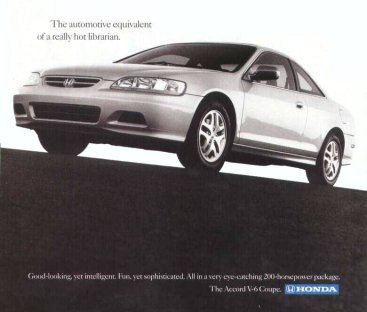
This has appeared in a variety of magazines and locations. It has been discussed on every list I belong to (and a few I don't, thanks to the folks who forwarded those emails to me!), most recently in the week right before the conference! The text reads: "The automotive equivalent of a really hot librarian. Good-looking, yet intelligent. Fun, yet sophisticated. All in a very eye-catching, 200-horsepower package. The Accord V-6 Coupe."
Now, I myself was quite bothered by this ad. It seemed to be a bit of a back-handed compliment to librarians! (Not to mention the hordes of good-looking and intelligent people out there.) It also seems to appeal to the "naughty librarian" image that seems to be so prevalent in pornography. Other list members, however, took it as a compliment to the profession, saying it was nice to be seen as a sex symbol. And the debate raged from there (with an interesting detour into what kind of car did folks see themselves as).
Now that we've talked about a moderately-priced car, let's talk about salaries.
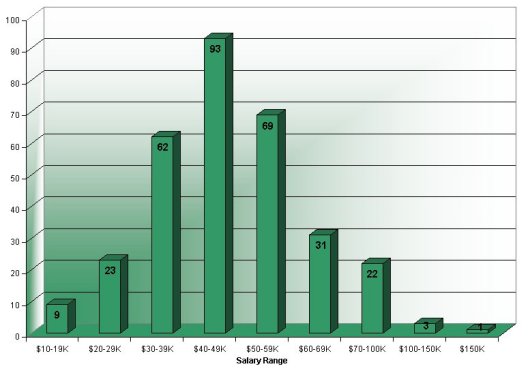
Talk about moderation! According to the U.S. Bureau of Labor Statistics, the median salary for librarians in the US is $42,730 (year 2000 dollars). It looks like we are smack average in this respect. But, again, it's about the label; the last line of their occupation definition says "May set up or work with database and information systems to catalogue and access information". But, if you look at the median salary for database administrators, it's much higher - $51,990. Ouch!
Let's talk about fun for a while... let's talk hobbies.
Unsurprisingly, when I asked folks what they did for fun, I got back a huge list of hobbies! What did surprise me was that more fellow hobbyists didn't comment on the librarians' profession; it was only a 3:2 ratio (154 to 101). I thought that there would be more people commenting! And, of those 154 comments, 75% of them were positive. However, the positivity came after initial surprise! ("That's what you do?") A few other comments on this topic were:
Before we move on to the big question, here's another comedic viewpoint on the profession: as rebels!
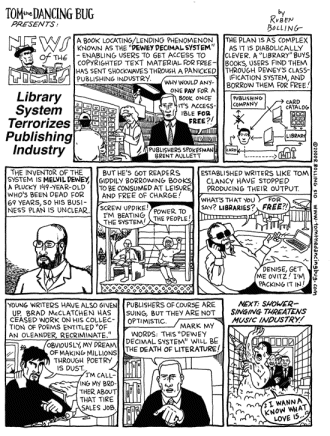
And now, on to the big question.
Do you think that your patron's view of your profession has changed in the last 10 years?
This is another response that surprised me. By a 3:2 ratio, the response was "Yes". But... this was only the first part of the question.
Has it changed for the better?
A whopping 87% of respondents said "Yes" here as well. Talk about being pleasantly surprised!
And yet, the included comments were biased rather strongly in the negative direction:
Now, let's complete the media input section with the last print ad:
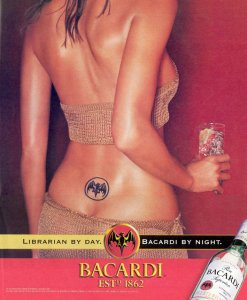
This one is a wowzer, and the most offensive of the bunch (and that's not just my own opinion but that of several others on the various lists). The text reads: "Librarian by day. Bacardi by night." What's going on here? Yes, on the one hand, it's always nice to have a representation that's not the stereotype; but on the other, does this representation do us any better?!? Talk about playing into the "naughty librarian" image... "Just imagine what will happen if you pour a little Bacardi down that librarian's throat! She'll drop her hair down and be ready to party hardy!" Sheesh.
Let's take a break and look at some positive portrayals in the media. As a part of the survey, I asked folks to send me back any portrayals they either liked or disliked in movies, books and on TV. The positive ones included:
|
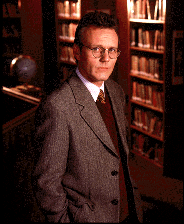
|
|
Interestingly enough, several of these also appear in the next list,
of negative portrayals:
| |
|
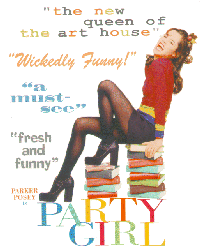
|
One more negative example, from the October 8, 2001 Newsweek: "It's getting harder to see the hottie beneath the librarian", in reference to Ashleigh Banfield cutting her hair and dying it brown for her trip to Pakistan. Again, sheesh!
For a bit more think-again humor, here's some of the other general comments made to the librarians who responded to my survey:
Also, please take a few moments to read some of the stories that respondents were willing to share with me. And here's one more portrayal that I think we've all appreciated at one time or another in our careers:

In conclusion:
In some arenas we are changing how patrons view us, but only in a few...and it's happening very slowly. Do we ourselves feed and reinforce the negative image of librarians today, by not being more "in your face" about who we are and what skills we bring to the party? How can we encourage people to see us as technologically savvy, while at the same time keeping our traditional skills? I wish I had some answers to these questions, but the question I asked at the beginning - which view more accurately reflects how patrons see us today - seems to have been answered. I was pleasantly surprised by the results of my survey (here are the actual numbers), which would indicate that yes, folks view us better than they did a decade ago, and the business world is starting to appreciate us more. However, so much seems to depend on the label we're called - organizations seem to value our skills more if they don't have the word "librarian" attached to them. I worked hard for my degree, and am proud to call myself a librarian. I hope the rest of you are, too.
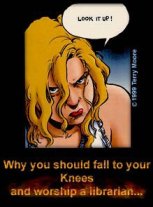 Some Sites with Attitude:
Some Sites with Attitude:
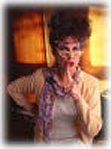
Other items that didn't really fit into the talk - quotes, cartoons, etc.
Information added after the fact, as I find it.